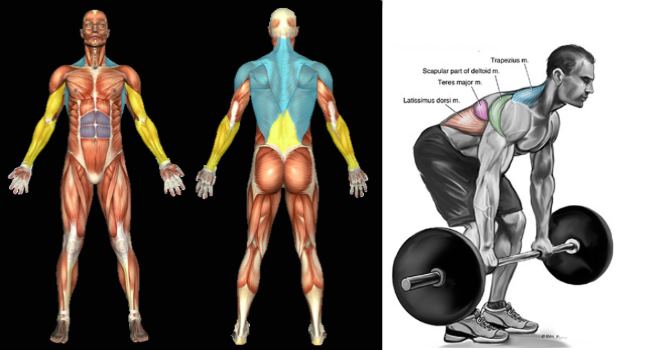The bent-over barbell row is a classic back thickness and strength builder. During this exercise you also use your lower back, the abs, which are used to stabilize your body, and the biceps which is contributing to this compound movement. This exercise can easily do some damage to your lower back, so make sure you are using correct form and adequate weights for it.
Barbell Row Muscles Worked
The barbell row is a free weight exercise embraced by the strength-seekers of all shapes and sizes. We’ve all been told at one point or another not to slouch – to straighten-up. Right? Well, if you want to work on your posture and increase your back mass, the barbell row is your friend. What else can it do for you? Which muscles does it work ? And just how do you do a proper barbell row, anyway?
The barbell row works the latissimus dorsi, known to most of us as “lats”; the trapezius, or “traps”, the posterior deltoids, and the rhomboids. Basically, this free weights lift works the major back and shoulder muscles.
Bent-over barbell row benefits
As stated above, the barbell row can help in improving your posture. Barbell rowers can also expect to see an increase in strength. Another important benefit is that the barbell row helps to create balance in size and strength between the muscles we use to pull our shoulder blades back and the chest muscles we use to pull our shoulders forward.
Here is a list of what this old school compound movement can do for you:
1. Build a Strong Back.
This exercise will help you to maximize upper body pulling strength. Using it with proper form should allow you to pull some seriously heavy poundages after a year or two of training.
2. Build a Thick Back.
The Bent Over Barbell Row is one of the best lifts for getting a thicker and wider back muscles. It works the entire back musculature and it has high capacity for handling big loads.
3. Build Explosiveness.
“Pulling explosively” means pulling faster without breaking the form while working. Doing “explosive” type of workout, will allow you to use heavier weights in time and increase your strength even further.
4. Strengthen the hips.
With this lift you will be strengthening the hips and learning how to bend properly while working out. This will help other movements using bending.
5. Carry Over to Bench Press and Deadlift.
The stronger you get executing the barbell row, the stronger you get on bench press and deadlift.
For a powerful bench press: The stronger your back, rear deltoids and biceps get while working barbell rows, the stronger your pectoral muscles, front deltoids and triceps get while working bench press. With the barbell row you work the opposite muscles from those involved in bench pressing, which contributes to a bigger bench press in time.
For a powerful deadlift: The explosive pull builds a strong posterior chain and hips, something that has a great impact and use in heavy deadlifting and even power cleans.
The Technique:
- Stand straight and grab the barbell a little wider than your shoulder width with your palms facing down. Slightly bend your knees, than bend your torso at the waist so that it gets almost parallel to the ground.
- While doing the movement, your back has to be straight.
- Keep your head up at all times, ensuring the barbell is hanging down in front of your body, arms extended, forming the starting position.
- Your body should maintain still. Then with your elbows close to the body lift the barbell upwards and exhale.
- When the barbell is at the top, touching your body, squeeze the muscles on the upper back and while squeezed hold for a moment.
- Than lower the bar and inhale, putting the bar back to the starting position.
- Repeat.
Tips & Safety
- First, before you start with your rowing exercise you need to warm up your back muscles with relatively light weights.
- Second, try to avoid excess strain on your lower back and body posture. This is possible by keeping the bar close to your body.
- It’s important that you keep your body posture and your back straight at all times of the movement.
